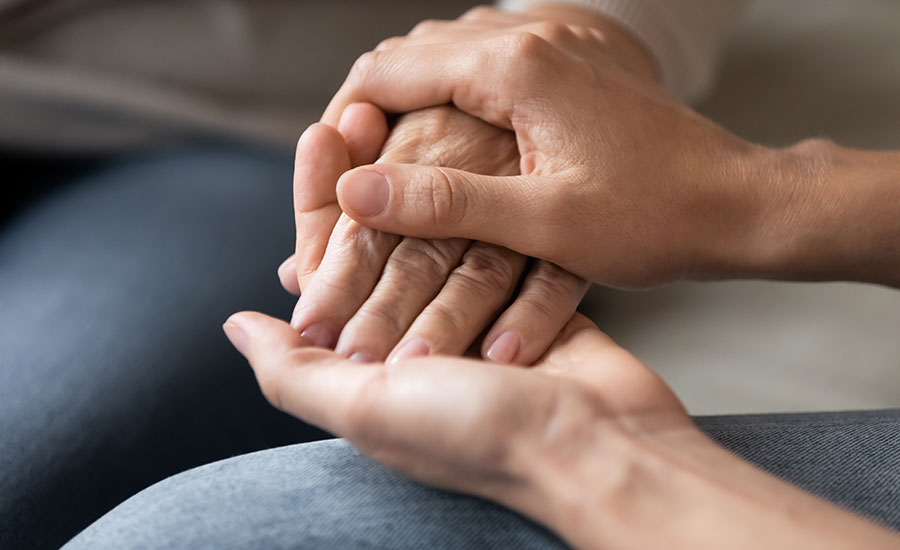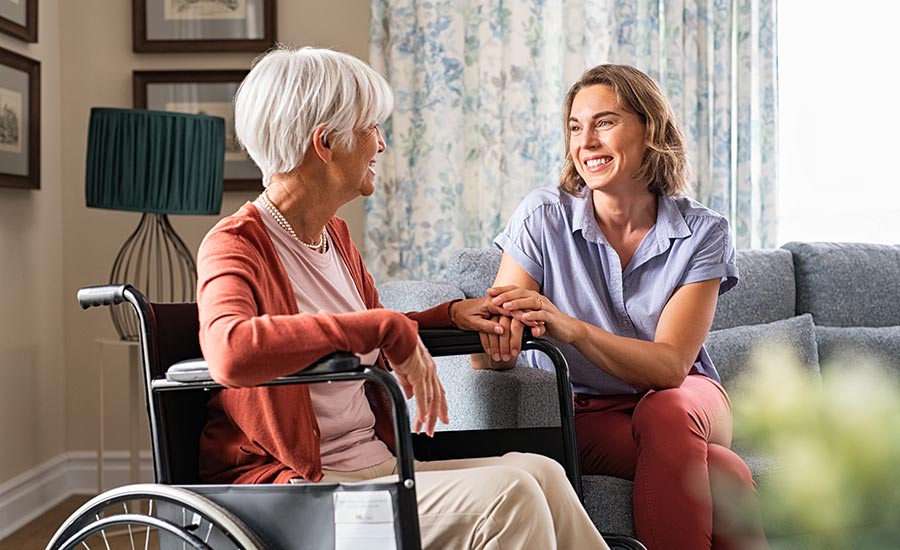What Is End-of-Life Care & How Can You Support Your Loved One?

The latter stages of a chronic illness can be a highly challenging, emotional time for family caregivers.
This makes end-of-life care an invaluable tool for many families. In fact, a study found that around 20 million people worldwide need this type of care.
If you’re curious about end-of-life care and how it can help both you and your loved one, we’re here to guide you.
In this article, we’ll define end-of-life care, how to plan for it, and how you can support your loved one through their final chapter.
Table of Contents
What Is End-of-Life Care?
End-of-life care provides comfort and dignity to elderly individuals as they approach the end of their lives. It includes managing pain and other distressing symptoms, to keep the patient comfortable.
This type of care offers physical, emotional, social, and spiritual support to patients and their families.
Who Provides End-of-Life Care?
Healthcare workers, human services professionals, and community agencies often help provide end-of-life care, including:
- Medical professionals who work at hospitals
- Senior living communities
- Residential care facilities
- Staff at your GP clinic
- Local rural clinic staff
- Local government agencies

When Is it Time for End-of-Life Care?
You can consider end-of-life care for your loved one when they experience a significant decline in physical or cognitive abilities that impacts their quality of life.
In addition, this type of care can be beneficial during the advanced stages of a chronic condition, such as kidney disease, late-stage dementia, or cancer.
For other life-limiting illnesses, consider discussing this care option with your loved one if you notice these signs:
- Your loved one frequently visits the emergency room and, while stabilized, their illness significantly progresses and impacts their well-being
- Your loved one has been hospitalized multiple times in the past year with the same or worsening symptoms
- Your loved one prefers to stay at home rather than in the hospital
- Your loved one decides to stop treatments for their condition
- Your loved one refuses to eat or drink
Key Benefits of End-of-Life Care
While it is common to feel a rollercoaster of emotions as your elderly loved one approaches their final days, end-of-life care can provide a myriad of benefits, including:
- Help manage pain and symptoms: End-of-life care provides specialized medical attention focused on reducing pain and managing symptoms, ensuring comfort for patients as they approach life’s end.
- Reduced risk of depression: By offering emotional support, companionship, and counseling, end-of-life care can help reduce feelings of isolation among terminally ill patients.
- Improved quality of life: End-of-life care goes beyond just treating medical symptoms. It focuses on the elderly patient’s entire well-being, including their emotional, social, and spiritual needs. This form of care enriches their life experiences and facilitates meaningful moments with family and friends in their final days, making each day as fulfilling as possible.
How to Plan for End-of-Life Care for Your Elderly Loved One
Planning end-of-life care for your elderly loved one is key to ensure they receive the respect, comfort, and dignity they deserve in their final days.
- Start the conversation early: Discuss final wishes with your loved one while they are still in good health. This can include their preferences for medical care or final arrangements.
- Understand your loved one’s wishes: Make sure you clearly grasp their desires regarding life-sustaining treatments, such as ventilators, resuscitation, and other medical interventions. For example, if your loved one chooses a do-not-resuscitate order, also known as a DNR order, document this clearly and communicate it to all healthcare providers involved in their care.
- Choose the right care options: Research and decide on the appropriate level of care, whether it’s home care, hospice, or palliative care, based on their health needs and preferences.
- Coordinate with your loved one’s healthcare providers: Build a relationship with their doctors, nurses, and other healthcare professionals to ensure their care plans are aligned with their wishes.
- Provide emotional and spiritual support: Acknowledge and address the emotional and spiritual needs of your loved one. Facilitate their access to counseling services, spiritual care, and support groups as they wish. Encourage open discussions about their feelings and beliefs, which can offer comfort and reassurance.
- Prepare for your loved one’s last days: Educate yourself about the signs and symptoms that suggest the end of life is near, such as increased sleep, decreased appetite, and withdrawal from conversation and activities. This can help you better prepare for the emotional aspects of caregiving.
- Get support from other family members and close friends: Arrange support for yourself and other family members. This can include family meetings, counseling, or simply ensuring close friends and family have time to spend with your elderly loved one.
- Review and adapt plans as needed: Be prepared to review and adjust care plans as your loved one’s condition changes. Flexibility is key to meeting their needs effectively.
How to Support Your Elderly Loved One During End-of-Life Care
Supporting your elderly loved one during their final days can be challenging, but your presence and understanding offer immense comfort.
This gentle approach eases their journey and assures them they are not alone in their sunset years.
To support your loved one at home:
- Create a comfortable environment: Arrange your loved one’s living space to maximize their comfort and accessibility. Consider investing in supportive pillows or a hospital bed to help them rest more comfortably.
- Manage your loved one’s pain and symptoms: Work closely with healthcare providers to administer medications and treatments effectively. Keep a log of symptoms and medication effects for reference during medical appointments.
- Keep preparing nutritious meals for your loved one: Serve small, easy-to-eat meals if their appetite is reduced. Consult a dietitian for advice on nutritious, soft foods and hydration. If your loved one refuses to eat, try offering their favorite foods in small portions or explore liquid options like smoothies or soups that are easier to consume and digest.
- Manage your loved one’s hygiene and personal care: Assist your loved one with daily grooming tasks, such as bathing, brushing teeth, and changing clothes, to help them feel good.
- Coordinate with your loved one’s healthcare providers: Maintain regular communication with doctors, nurses, and hospice care teams to stay informed about your loved one’s health and any changes to their care plan.
- Offer emotional support: Spend quality time with your loved one, listen to their concerns, and share happy memories. This emotional support is vital in providing comfort during their final days. If you’re not sure what to say, read our guide for helpful tips.
- Seek support: Take breaks and connect with community resources or support groups designed for those caring for loved ones at the end of their life.

If your loved one needs end-of-life care at a senior living facility, here’s what you can do:
- Personalize your loved one’s space: Decorate their room with personal items like photos, artwork, and keepsakes to make the space feel homey and familiar.
- Stay informed about your loved one’s care plans: Regularly communicate with the senior living staff to stay updated on your loved one’s health and any changes in their care plan.
- Ensure comfortable mobility: Work with your loved one’s facility to ensure that mobility aids are appropriate and accessible, and that the environment is safe and easy to navigate.
- Coordinate visits and social interaction: Schedule regular visits from family and friends. Encourage your loved one to take part in facility activities to stay socially engaged.
- Offer emotional support: Visit frequently, have meaningful conversations, and provide a listening ear to your loved one.
- Advocate for quality care: Be proactive in discussing and ensuring the fulfillment of your loved one’s preferences and needs with the care staff. For example, make sure the staff is aware of your loved one’s favorite foods, daily routines, and any specific comfort measures they prefer.
- Prepare for changing needs: Stay flexible and adapt the care plan as your loved one’s condition changes, ensuring it always meets their evolving needs.
Explore Supportive Care Services at Always Best Care
At Always Best Care, we are dedicated to providing exceptional healthcare services tailored to the unique needs of the elderly, including end-of-life care, respite care, dementia care services, and beyond.
Our end-of-life care services are crafted to ease this difficult transition, offering comfort and support to both your family and your loved one when you need it most.
For over 25 years, our committed team has delivered reliable senior care throughout the United States and Canada.
With a network of over 250 territories, we are well-positioned to offer families outstanding support and care.
Our reliable services include:
- In-home care: We offer 24/7 assistance including meal preparation, laundry, companionship, and help with bathing, grooming, and dressing.
- Skilled home health care services: Available in certain areas, we develop personalized care plans for chronic conditions like diabetes and manage ongoing illnesses. Our vetted and trained caregivers are committed to providing comprehensive and convenient care.
- Specialized home care services: We support daily social interaction and provide health care guidance from your loved one’s home. Using advanced technology such as personal emergency response systems and remote patient monitoring, we efficiently manage symptoms.
- Senior living referral services: We help you find the best senior living community for your loved one by matching their needs and preferences.
- Respite care services: We provide flexible support, from short breaks to extended care periods, allowing you a well-deserved break from caregiving.
- Dementia care services: We offer compassionate and safe care for loved ones with dementia, focusing on their comfort and well-being.
- Veterans assistance program: We assist veterans in accessing financial aid for care as a token of our respect for their service.





